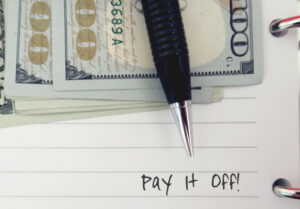Have you ever felt like, no matter what you do, you can’t seem to get ahead of everything?
It feels like, no matter what you do, you are always struggling to keep up. This has never been truer than these pandemic times that we are currently living in.
With people either losing jobs, being furloughed, or having their salaries reduced, everyone has been affected financially in some way. And yet, we still need to buy things to survive.
Whether you have been using credit cards to buy things here and there, or you experienced a major unexpected bill (medical, home repair, etc.), most people are dealing with some sort of credit card debt now.
What if there was a way to eliminate that credit card debt, so you could keep the money you earned instead of just using it to make a dent in your debt?
Whatever your situation is, we want to share 6 ways to easily eliminate your credit card debt.
-
Cut and Budget

Before you do anything, you must commit to not increasing your credit card debt by much (if at all). Find out how much you owe on each card, and plan to stop paying with a credit card. You won’t be able to ever catch up on debt if you keep adding to it (or pay a little but charge a lot).
Once you’ve decided to stop using your cards, the next thing is to budget. Figure out the essential spending – food and bills. Everything else can and should wait until you are in a better place financially.
-
Transfer Balances to a 0% Credit Card

Credit card interest, where a “penalty” fee is added to the total amount you owe (based on how much it is) is one of the quickest ways your debt can increase. There are 0% interest credit cards available to anyone with a good credit score (around 700 or higher). You can transfer your balance to a 0% card and not have any interest added to it if the balance is paid in full by the end of the introductory period (around a year).
If you have good credit and a good plan to pay off your debt, transferring the debt to this one card is a great way to get rid of your debt without it increasing.
This is also known as “debt consolidation”, where, instead of paying off multiple credit cards with different balances, you are making one payment for one debt. If you have a good plan in place (and use the other ways mentioned in this article), debt consolidation is an effective way to eliminate your debt.
-
Pay Your Minimum Payment Twice

When dealing with credit cards, people usually pay the minimum amount and hope for the best. Like we previously mentioned, just paying the minimum is not going to eliminate debt anytime soon. You may not be in a situation where you can pay off everything at once, so try paying twice the minimum due. It decreases the amount you owe, and it is still a manageable goal.
-
The Snowball Method

One of the most common and effective ways to pay off credit card debt is the “Snowball Method”.
The Snowball Method is where you list all the credit cards you have debt on, from most to least, and start paying minimum payments on all but the card with the lowest amount.
For the lowest card – pay off that debt as aggressively as you can. Once you pay off the lowest card, start making payments (using the same aggressive principle as the first one), and pay off that one. You repeat this method over and over and, with enough consistency and payments, your original payments have “snowballed” into larger payments that will eliminate your debt faster.
-
The Avalanche Method

The Avalanche Method is like the Snowball Method, except instead of focusing on the lowest amount of debt, you focus on the card with the highest interest amount. You keep making the payments until the first card is done, and then you apply those payments to the next card.
-
Talk to an Expert

Everybody’s situation is different, and you cannot expect that what worked for someone else may work for you. To truly understand what would be best for you, you can talk to a Credit Counselor. These people are experts in managing credit in figuring out solutions that would work best for you. The National Foundation for Credit Counseling is a great resource to contact to find local nonprofit credit counselors in your area.
Debt should not be a topic that people refuse to discuss. It affects most of us, and the stigma of having debt has led to people being afraid to talk about it (and therefore find any solutions). Use these resources to begin to eliminate your debt and regain a financially healthy life.





Leave A Comment